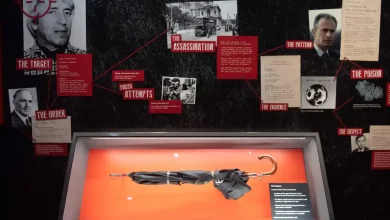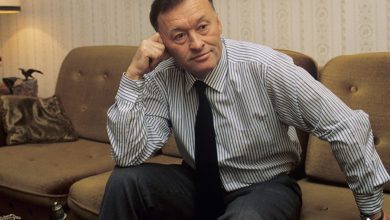
The Mysterious Fates of Putin’s Critics: A Real-Life Spy Thriller
In a world that often mirrors the suspense and intrigue of a James Bond movie, the life stories of those who dare to criticize Vladimir Putin, Russia’s enigmatic leader, often take on the tone of a thrilling espionage narrative. The pages of history are filled with accounts of critics who met mysterious and sometimes deadly ends, leaving the world captivated by a real-life spy thriller that continues to unfold. This article delves into the chilling saga of Putin’s critics, exploring their stories and the shadowy circumstances that have surrounded their fates.
Key Takeaways
- Putin’s critics have faced a series of mysterious and often deadly fates, raising questions about the lengths to which the Kremlin will go to silence dissent.
- Figures like Yevgeny Prigozhin, Boris Nemtsov, and Alexander Litvinenko have met tragic ends, sparking speculation about Kremlin involvement.
- The deaths of outspoken critics underscore the high stakes of challenging Putin’s authority and the dangerous climate of dissent within Russia.
- While some critics are silenced through untimely deaths, others like Alexey Navalny persist in their opposition, highlighting the resilience of those who challenge Putin’s regime.
Putin’s Critics: A Dangerous Game of Cat and Mouse
Yevgeny Prigozhin, once a powerful oligarch and member of Putin’s inner circle, is the latest addition to this list. His story began two months ago when he attempted a march on Russia, which ended in failure. While initially surviving the aftermath of his insurrection, Prigozhin’s plane tragically plummeted from the sky, and he is now presumed dead. The cause of the crash remains officially unknown, with Russian authorities launching a criminal investigation. No concrete evidence points to Kremlin involvement, but speculation runs rampant.
Bill Browder, a prominent Putin critic and former major investor in Russia, noted on social media that “Putin never forgives and never forgets.” This sentiment seems to echo through the fates of other outspoken critics who dared to challenge Putin’s authority.

Boris Nemtsov: A Vocal Critic Silenced
Boris Nemtsov, a vocal Kremlin critic and former deputy prime minister under President Boris Yeltsin, met a tragic end in February 2015 when he was shot dead in central Moscow. His work against Putin’s government and his efforts to expose Russian troop involvement in Ukraine made him a target.

Boris Berezovsky: The Colorful Businessman Turned Fugitive
Boris Berezovsky, a colorful character and once-powerful Russian businessman, fell out of favor with the Kremlin and fled to England. He faced allegations of fraud and tax evasion and accused Russia of attempting to assassinate him. Berezovsky’s life ended mysteriously in 2013 when he was found dead in his UK home.

Alexander Perepilichnyy: Poisoned Whistleblower
Alexander Perepilichnyy, a financier who provided evidence of alleged fraud against Russian tax officials, died suddenly in 2012. Initially believed to be a natural death, traces of rare plant poison were later discovered in his system, sparking speculation of foul play.

Sergei Magnitsky: Uncovering Corruption at a Deadly Cost
Sergei Magnitsky, a Russian lawyer, uncovered a massive tax fraud scheme involving Russian government officials and died in custody in 2009. His death led to the Magnitsky Act in the United States, which sanctions individuals involved in human rights violations.

Alexander Litvinenko: A Poisoned Ex-Spy
Alexander Litvinenko, a former Russian agent turned Kremlin critic, was poisoned in a London hotel in 2006 with a highly radioactive substance. A British inquiry suggested that Putin “probably approved” his killing.

Anna Politkovskaya: The Journalist Who Paid the Price
Anna Politkovskaya, a vocal critic of Russia’s war in Chechnya, was gunned down in Moscow in 2006. Her work chronicling human rights abuses angered Russian authorities, and her murder remains unsolved.

The Web of Suspicion Widens
These critics are not the only ones whose lives have taken tragic turns. General Gennady Lopyrev, with knowledge of Putin’s Black Sea residence, died under suspicious circumstances. Russian businessmen linked to energy giants Gazprom and Lukoil have also faced unusual deaths, some of which raised questions about their connections to Putin’s government.

The Ongoing Saga: Alexey Navalny
Not all critics meet untimely ends, but many are neutralized, including Alexey Navalny, the prominent opposition leader who survived a poisoning attempt but remains jailed in Russia.

FAQ: Unraveling the Enigma of Putin’s Critics
1. What role did Yevgeny Prigozhin play in Putin’s inner circle, and how did his story take a dramatic turn?
Yevgeny Prigozhin, once a powerful oligarch and trusted member of Putin’s inner circle, attempted a march on Russia two months ago, which ultimately failed. Surviving the initial fallout, Prigozhin’s fate took a tragic twist when his plane crashed, leading to his presumed death. While official investigations are underway, speculation surrounds the circumstances. The world watches closely, wondering about Kremlin involvement and the motives behind this mysterious incident.
2. How does Bill Browder’s statement “Putin never forgives and never forgets” resonate with the fates of Putin’s critics?
Bill Browder, a prominent Putin critic and former major investor in Russia, aptly captured the underlying theme of Putin’s dealings with critics. This sentiment seems to echo through the fates of other outspoken critics who have faced untimely and often deadly consequences for daring to challenge Putin’s authority. It speaks to the high stakes of opposing a leader who brooks no dissent and is known for his uncompromising approach to those who challenge him.
3. Can you elaborate on the tragic end of Boris Nemtsov, a vocal Kremlin critic?
Boris Nemtsov, a vocal Kremlin critic and former deputy prime minister, met a tragic end when he was shot dead in central Moscow. His work against Putin’s government and his efforts to expose Russian troop involvement in Ukraine made him a prime target. His killing took place within sight of the Kremlin, underscoring the brazen nature of his assassination. The unresolved questions surrounding his death highlight the dangers of criticizing the Russian government under Putin’s rule.
4. What led to the downfall of Boris Berezovsky, a once-powerful Russian businessman?
Boris Berezovsky, a colorful character and former powerful Russian businessman, fell out of favor with the Kremlin and fled to England. His allegations of fraud, tax evasion, and accusations against Russia led to his exile. Berezovsky’s mysterious death in 2013 raised further questions about the extent of his conflicts with Putin’s government and the potential involvement of Russian authorities in his demise.
5. Can you shed light on the circumstances surrounding Alexander Perepilichnyy’s sudden death?
Alexander Perepilichnyy, a financier who provided evidence of alleged fraud against Russian tax officials, died suddenly in 2012. Initial reports indicated a natural death, but subsequent investigations revealed traces of rare plant poison in his system. The discovery of this poison sparked suspicions of foul play and brought into question the motivations behind his untimely demise.
6. How did Sergei Magnitsky’s efforts to uncover corruption lead to his tragic end?
Sergei Magnitsky, a Russian lawyer, uncovered a massive tax fraud scheme involving Russian government officials and died in custody in 2009. His death prompted the Magnitsky Act in the United States, which targets individuals involved in human rights violations. Magnitsky’s case highlights the risks faced by those who challenge corruption within the Russian government and the lengths to which authorities might go to silence them.
7. What were the circumstances surrounding the poisoning of Alexander Litvinenko?
Alexander Litvinenko, a former Russian agent turned Kremlin critic, was poisoned in a London hotel in 2006 with a highly radioactive substance. A British inquiry suggested Putin “probably approved” his killing. Litvinenko’s case underscores the lengths to which the Russian government might go to eliminate those who threaten its interests, even on foreign soil.
8. How did Anna Politkovskaya’s critical journalism put her life at risk?
Anna Politkovskaya, a vocal critic of Russia’s war in Chechnya, was gunned down in Moscow in 2006. Her work chronicling human rights abuses and corruption infuriated Russian authorities. Her unsolved murder serves as a stark reminder of the dangers faced by journalists who expose government abuses and the challenges of seeking justice in an environment where critics are targeted.
9. Can you provide insights into the suspicious deaths of General Gennady Lopyrev and Russian businessmen linked to energy companies?
General Gennady Lopyrev’s suspicious death, along with unusual deaths of Russian businessmen tied to energy giants Gazprom and Lukoil, raises concerns about the extent of their connections to Putin’s government. The circumstances surrounding these deaths underscore the complexity of power dynamics within Russia’s business and political spheres and leave room for speculation about potential motives.
10. What is the ongoing saga of Alexey Navalny, and what does it reveal about the Kremlin’s approach to dissent?
Alexey Navalny, a prominent opposition leader, survived a poisoning attempt but remains imprisoned in Russia. His case exemplifies the Kremlin’s approach to silencing dissenters, even when their efforts to eliminate critics fail. Navalny’s resilience underscores the risks faced by those who challenge Putin’s regime and the broader implications for human rights and political freedom in Russia.
Conclusion: A Chilling Reminder of Power Dynamics
As we navigate through the tumultuous landscape of Putin’s Russia, the stories of his critics serve as a chilling reminder of the power dynamics at play. The narratives of individuals like Boris Berezovsky, Sergei Magnitsky, and Anna Politkovskaya reveal the risks associated with challenging a government known for its ruthless suppression of dissent. The mysterious circumstances surrounding their deaths underline the vulnerability of those who dare to speak out against Putin’s rule.
While the fates of Putin’s critics may resemble scenes from a spy thriller, they are a stark reality that demands global attention. The ongoing saga serves as a cautionary tale about the fragility of freedom of expression in an environment where opposing voices are silenced, often with deadly consequences. As the world watches and questions, the enigma of Putin’s critics reminds us that the fight for transparency, justice, and human rights is far from over.









